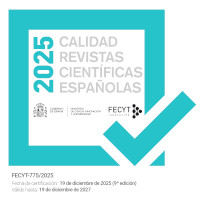MONOGRAPHIC: RADIO IN TRANSFORMATION: CONTEMPORARY PERSPECTIVES AND CHALLENGES
Title of the monographic:
Radio in transformation: contemporary perspectives and challenges
Thematic editors:
Carlos López Olano
carlos.lopez-olano@uv.es
ORCID: 0000-0002-8121-5999
Andrej Brnik
andrej.brnik@ucm.sk
ORCID: 0000-0003-2876-1429
Ľubica Janáčková
lubica.janackova@ucm.sk
ORCID: 0000-0002-0672-7206
Deadline for submission of articles: March 13, 2026
Publication date: June 2026
Read more about MONOGRAPHIC: RADIO IN TRANSFORMATION: CONTEMPORARY PERSPECTIVES AND CHALLENGES






















